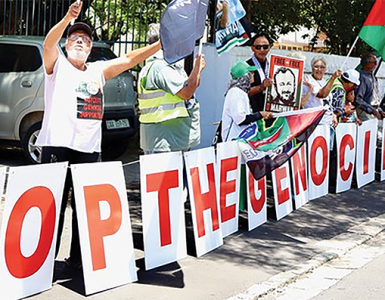TIME BOMB:Youth unemployment reaches alarming proportions
By Isaac Moledi
Faced with the dire situation of youth unemployment and its relative evil attendants, the South African government is expected to think out of the box to try and remedy what analysts warn could be a ticking “time bomb”.
According to Dr Bernice Hlagala, chief director in the Department of Women, Youth and Persons with Disabilities, the awful youth unemployment situation has necessitated the government to come up with plans to address this “long-standing challenge”.
Dr Hlagala said South Africa’s unemployed youth could soon receive a major boost following government’s plan to introduce various unemployment interventions including a new universal basic income grant for the youth as unemployment statistics among those aged between 15 to 34 years.
According to Hlagala, the government is concerned about the high unemployment figures among the youth that is why it intends to introduce some interventions and a new basic universal income grant to support young people and young discouraged job seekers’ effort to enter the labour market.
Although the details around the basic universal grant are yet to be announced, Hlagala described it as an incentive similar to the Covid-19 Social Relief of Distress grant which will primarily support young people and young discouraged job-seekers “to transition into employment or entrepreneurship”.
According to the latest Quarterly Labour Force Survey (QLFS) published by StatSA, South Africa’s unemployment among those aged between 15 to 34 years stands at 46.3%.
About 9.3% of these young unemployed jobseekers are university graduates.
The policy is aimed at strengthening youth development, both during and post the Covid-19
Other unemployment interventions which have been proposed by the department in the policy include:
Abolish the requirement for experience for entry-level jobs, a national pathway management network, the offering of practical experience to young people etc.
Hlagala was echoing social development minister Lindiwe Zulu in calling for the urgent introduction of a basic income grant to replace the Covid-19 social relief of distress grant which expired at end-April even though government is in the grip of a fiscal crisis.
In March all the major opposition parties expressed support for the idea, which has been on the ANC agenda for more than two decades, in a mini-plenary debate in the National Assembly.
According to a June 2020 document seen by Bloomberg, the ANC has proposed paying a R500 monthly grant to those aged 19 to 59 who aren’t normally eligible for other aid. This would cost the state R197.8 billion a year.
Between 50% and 60% of the money could be recouped by levying extra taxes on those with jobs, it said.
At the Presidential Jobs Summit in 1998 COSATU negotiated an agreement by government to investigate a universal social grant for all South Africans – the Basic Income Grant. Government policymakers, civil society stakeholders and South African and international thinkers recognised the merit of addressing the problem of poverty directly and efficiently.
In March 2002 the South African government’s Committee of Inquiry into Comprehensive Social Security accepting the findings of research commissioned from the Economic Policy Research Institute, the Committee’s report stated that “the Basic Income Grant has the potential, more than any other possible social protection intervention, to reduce poverty and promote human development and sustainable livelihoods.”
The average grocery bill for essentials is estimated to be around R2,300–2,900. Because most fruit, vegetables, and meat are sourced locally, prices are kept low. Luxury items and imported foods, including potatoes, are priced slightly higher and can increase the cost of your shopping bill.
The figures are to be used as guidelines only. Please note that prices are correct at the time of going to print.
Value Added Tax (VAT) is levied on most goods and services in South Africa. The current rate is 15% which is usually included in the marked price. Non-South African citizens or residents may claim back VAT on items taken out of the country provided the total value exceeds a specific amount. Documentation as proof will be required at the point of exit.
FIGURES AND GRAPH SUPPLIED BY THE WITS UNIVERSITY RESEARCH DEPARTMENT
FOOD
Bread 1 Loaf R12.00 – R15.00
Potatoes 1 Kilogram R15.00 – R25.00
Milk 2 Litres R20.00 – R25.00
Eggs 1 Dozen R23.00 – R30.00
Pizzas R50.00 – R100.00 (depends on the size)
Monthly groceries/meals for one person R2,000 – R4,000


































